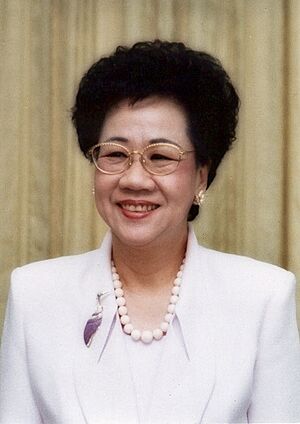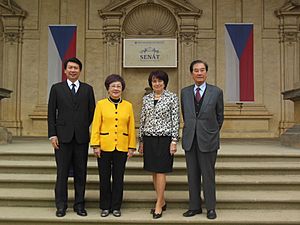Annette Lu facts for kids
Quick facts for kids
Lu Hsiu-lien
|
|
|---|---|
|
呂秀蓮
|
|

Official portrait, 2005
|
|
| 8th Vice President of the Republic of China | |
| In office 20 May 2000 – 20 May 2008 |
|
| President | Chen Shui-bian |
| Preceded by | Lien Chan |
| Succeeded by | Vincent Siew |
| Chair of Democratic Progressive Party | |
| Acting 8 December 2005 – 15 January 2006 |
|
| Preceded by | Su Tseng-chang |
| Succeeded by | Yu Shyi-kun |
| 10th Magistrate of Taoyuan | |
| In office 28 March 1997 – 20 May 2000 |
|
| Preceded by | Liau Pen-yang (acting) Liu Pang-yu |
| Succeeded by | Hsu Ying-shen (acting) Eric Chu |
| Member of the Legislative Yuan | |
| In office 1 February 1993 – 31 January 1996 |
|
| Constituency | Taoyuan County constituency |
| Personal details | |
| Born | 7 June 1944 Tōen Town, Shinchiku Prefecture, Japanese Taiwan (now Taoyuan District, Taoyuan City, Taiwan) |
| Nationality | Taiwanese |
| Political party | Democratic Progressive Party (after 1986) |
| Other political affiliations |
|
| Education | National Taiwan University (LLB) University of Illinois Urbana-Champaign (LLM) Harvard University (LLM) |
| Annette Lu | |||||||||||||
|---|---|---|---|---|---|---|---|---|---|---|---|---|---|
| Traditional Chinese | 呂秀蓮 | ||||||||||||
|
|||||||||||||
Lu Hsiu-lien (Chinese: 呂秀蓮; pinyin: Lǚ Xiùlián; Pe̍h-ōe-jī: Lū Siù-liân), also known as Annette, was born on June 7, 1944. She is a Taiwanese politician and lawyer. She is known for her work as a feminist and for being part of the tangwai movement, which pushed for democracy in Taiwan.
Lu joined the Democratic Progressive Party (DPP) in 1990. She was elected to the Legislative Yuan (Taiwan's parliament) in 1992. Later, she served as the leader of Taoyuan County from 1997 to 2000. From 2000 to 2008, she was the Vice President of Taiwan alongside President Chen Shui-bian.
Before her political career, Lu studied law at National Taiwan University. She also earned advanced law degrees from the University of Illinois Urbana-Champaign and Harvard University. She ran for president in 2007 and 2012 but later supported other candidates. In 2019, she announced her plan to run for president again but later stopped her campaign.
Contents
Early Life and Education
Lu was born in Tōen Town, which is now Taoyuan City, in northern Taiwan. This was during the time when Japan ruled Taiwan. Her family has roots from both the Hoklo and Hakka groups. Her father's family came to Taiwan from China in 1740. She has one older brother and three older sisters.
After finishing high school at Taipei First Girls' High School, Lu went on to study law at National Taiwan University (NTU). She graduated from NTU in 1967. She then continued her studies abroad, earning two Master of Laws (LL.M.) degrees. One was from the University of Illinois at Urbana–Champaign in 1971, and the other was from Harvard Law School in 1978. At Harvard, she was a classmate of Ma Ying-jeou, who later became a president of Taiwan.
Journey into Politics
During the 1970s, Lu became a well-known advocate for women's rights in Taiwan. She wrote a book called New Feminism. She left her membership in the KMT party and joined the tangwai movement. This movement worked to bring more democracy to Taiwan. She also worked for Formosa Magazine, which was important for the democracy movement. Lu became very active, speaking out for democracy and against strict government rule.
In 1979, Lu gave a speech at an event for International Human Rights Day. This event became known as the Kaohsiung Incident. After this, many leaders of Taiwan's democracy movement, including Lu, were put in prison. A military court found her guilty and sentenced her to 12 years in jail. Amnesty International called her a prisoner of conscience. Because of pressure from other countries and the efforts of people like Ma Ying-jeou, she was released in 1985. She had been in prison for about five and a half years.
In the 1990s, Lu worked to help Taiwan rejoin the United Nations. She believed Taiwan should join under its own name, "Taiwan," not "Republic of China."
Elected Public Roles
Lu officially joined the Democratic Progressive Party in November 1990. In 1992, she was elected to the Legislative Yuan, which is Taiwan's main law-making body. In 1997, she won the election to become the leader (Magistrate) of her hometown, Taoyuan. She held this position until 2000. That year, Chen Shui-bian chose her to be his running mate for the presidential elections.
Her Novel
While she was in prison, Lu wrote a novel called These Three Women. To avoid being watched by the prison guards, she wrote parts of her novel on toilet paper, using a washbasin as her desk. In 2008, her novel was turned into a TV drama with the same name. The drama was shown on television starting November 24, 2008.
Vice President of Taiwan (2000–2008)
On March 18, 2000, Lu was elected Vice President of Taiwan. In 2001, she received the World Peace Prize from the World Peace Corps Mission. She was the first elected Vice President of Taiwan to use a Western first name. In an interview, she mentioned that the previous ruling party, the KMT, never expected to hand over power to her, a former democracy activist.
Lu considered running for president in the 2008 ROC presidential election. She announced her candidacy on March 6, 2007. However, after getting only a small percentage of votes in her party's primary election, she decided to withdraw from the race.
Campaign Incident
On March 19, 2004, while campaigning in Tainan, Lu was shot in her right knee. President Chen Shui-bian was also shot in his stomach at the same event. Both survived and were released from the hospital on the same day. The next day, the Chen/Lu team won the election by a very small margin.
Later Political Activities

In March 2018, Lu announced her intention to run for mayor of Taipei for the Democratic Progressive Party. However, after the DPP chose Pasuya Yao as their candidate, Lu stated she would leave the party.
She remained a DPP member through 2019. In September 2019, she announced that she would run for president in the 2020 Taiwan presidential election with Peng Pai-hsien as her running mate, representing the Formosa Alliance. On November 2, 2019, Lu ended her presidential campaign.
Taiwan's Relationship with China
When it comes to Taiwan's relationship with mainland China, Lu has often spoken more strongly in favor of Taiwan independence than President Chen Shui-bian. Because of this, she has been criticized by both the government of the People's Republic of China and by those who want China and Taiwan to unite. Her comments have led Chinese state newspapers to accuse her of causing bad feelings between people on both sides.
In 2010, Lu visited South Korea. She talked about Taiwan using "soft power" – meaning peaceful economic and political growth – as a way to solve international problems. In April 2013, speaking at George Washington University, Lu said that the DPP should try to understand mainland China better. She believed Taiwan's future depends on what happens on the mainland. She also said that Taiwan and mainland China should not hate each other or go to war. Instead, they should live peacefully, work together in business, and share their cultures.
On April 29, 2013, Lu spoke in Taipei at the start of the Anti-One China Principle Union. She warned that China might slowly take over Taiwan, especially since the Anti-Secession Law was introduced in 2005. She said that Taiwan's independence was slowly being taken away. However, she also said that Taiwan is not against the idea of one China existing in the world, but that Taiwan is not part of China. She criticized then-President Ma Ying-jeou for making Taiwan too dependent on China. She repeated her idea of the "1996 Consensus" (different from the Kuomintang's 1992 Consensus). In her view, Taiwan has been an independent country since the 1996 presidential election.
Legal Challenges and Outcome
On September 21, 2007, Lu, along with DPP chairman Yu Shyi-Kun and National Security Office secretary-general Mark Chen, faced legal accusations related to funds. Lu was accused of misusing about US$165,000 from special funds. However, on July 2, 2012, all three were found not guilty of all charges.
See also
 In Spanish: Annette Lu para niños
In Spanish: Annette Lu para niños
- Politics of the Republic of China
- Democratic Pacific Union
 | James Van Der Zee |
 | Alma Thomas |
 | Ellis Wilson |
 | Margaret Taylor-Burroughs |

